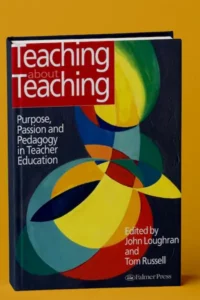Teaching about Teaching will provide you with Purpose, Passion, and Pedagogy in Teacher Education. Check it out.
Teaching About Teaching
Considers teacher education as an important aspects of the teaching profession and demonstrates why it is so important for higher education institutions to value their teacher educators’ professional knowledge.
The book demonstrates how teaching about teaching knowledge pedagogy is vital to the development of quality in teacher education and how this knowledge needs to be articulated and communicated throughout the teaching profession, both in schools and universities.
Teaching about Teaching is a well-written, thought-provoking, introspective text. The essays are written by and for teachers, offering the voices we too often fail to hear.
- For experienced teacher educators, this book serves as a means of reaffirming what they already do in their university classrooms.
- For others, particularly instructors new to the field of teacher education, this text offers practical suggestions and means by which to teach teachers the skills they will need in the classroom … this information results in a practical as well as theoretical discussion that links research and theory with practice.’
In these times, it is much in vogue to speak of silenced voices. The reference is typically to the voices of teachers, women, children, or members of minority groups. It also applies to the voices of teacher educators.
We hear the voices of university researchers, of law makers, and of policy analysts, speaking about what teacher educators do or fail to do, but we do not often hear the voices of teacher educators themselves. This book begins the remedy for lopsided talk about teacher education.
This volume makes a vital contribution to the creation of scholarly space and the finding of professional voice for teacher education. It reveals the delight, the frustrations, and the rewards of being a teacher educator.
It gives to teacher educators what they have had too little of, a public voice that speaks of personal experience and grounded theory with passion and with purpose. While it is true that these voices are raised within the same family of teacher educators, that is a benefit in this case.
For those I have here identified as members of the Reflectivist family are among the most passionate, most concerned teacher educators. They are the ones who have so willingly engaged in the study of their own and one another’s professional practices.
They are the ones who have organized conferences on teacher education, created new and different literatures about teacher education, and brought so many different elements of reflective scholarship to bear on its study and its practice.
In this book we witness the fruits of their good labors. I trust it is as much a treat for you as it has been for me.




